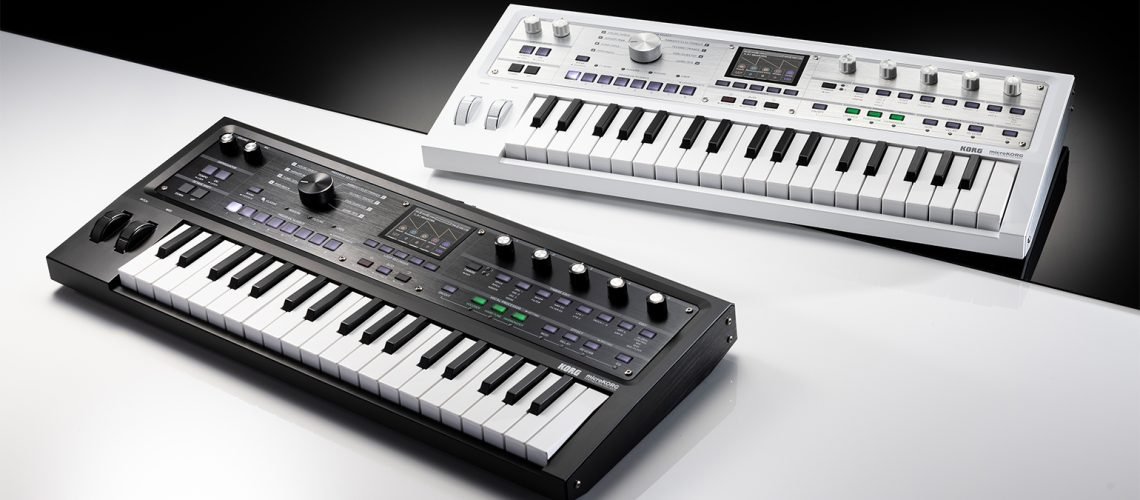KORG remains on a quest to get some microKORG mojo going. But both new models – a new microKORG and a 37-key KingKORG Neo – are trying. One looks like it’s closer to the appeal of the original than the other. Here’s a preview.
KORG’s original microKORG remains one of the greatest, maybe the greatest, breakout synth hits of all time. It seems you just couldn’t stop this instrument from topping sales charts – or, as it turned out, even replace it. The microKORG XL (2008) and (2015) never quite captured the same magic. Price is the easy explanation; plus a beefed-up sound engine doesn’t always match with sheer force of character. The microKORG-S, which is basically just a pricier OG microKORG with a built-in speaker seems to be outselling any of the others, remarkably.
Now the question is whether these 2024 offerings can win over some customers in the sub-$1000 market. Here’s what you’ve got:
microKORG – apparently officially “the new microKORG” though retailers are still listing “microKORG2”:
- Analog modeling synthesis
- 8 voices (or dual 4 voices; hard tune or harhmonizer 4 voices, both 2 voices)
- That big honking knob with genre presets (people really do love that, you know)
- Modulation, Delay, Reverb, EQ
- Arpeggiator with 10 types
- 37 mini keys, no aftertouch
- 2.8″ LCD and five dedicated edit knobs
- 4 hours battery life on AAs
- MIDI in, out
- USB-C
- $599 street [I think, at the moment preorders appear to be missing!]

(Uh, “a new origin?” What? Wait, conspiracy theorists – that’s the name of a microbrewery in … Asheville, North Carolina! Home of Moog… That means… okay, absolutely nothing, moving on.)
The main thing is then the display/edit knobs, which means you can now see what you’re doing and actually edit parts properly. The vocal processor is also massively upgraded, with “industry-standard hard-tune pitch correction effects” and a new harmonize.
And there’s a loop recorder in there, too, with dedicated control buttons including a crucial undo/redo.

I’m going to go out on a limb and say that I suspect KORG has a winner here, just by upgrading the vocal side of the equation and making things easier with a display. The price point isn’t the original price point, but finally understanding vocalists are the market makes a bunch of sense. It’s incredible it took them decades to work that out, but yes – the price and the fact that you had a synth that was simple and friendly and affordable for a singer/keyboardist was what made the microKORG a blockbuster.
For synth specs, yeah, you’re not going to get very excited over the microKORG. This is really for vocalists and vocoder lovers, and … finally having a looper is a huge plus.
It’s a little more expensive than an original microKORG, but I’ll bet the display and looper make that fairly accessible to microKORG buyers, and given how well the microKORG-S was doing at nearly this price point, I think it’ll sell like flapjacks.
Then there’s KingKORG Neo (which seems to be adopting an Airbus approach to names):
- eXpanded Modeling Technology (XMT) – so another VA, but with a more advanced architecture
- 24-voice polyphony
- 37 keys (velocity and release-velocity sensitive)
- 1 filter (LPF, HPF, BPF)
- 2 EGs, 2 LFOs
- Some semi-modular capabilities (virtual patching with 6 settings)
- 6 pre FX (distortion, decimator, ring mod, guitar amp, EP amp, tone), 6 “mod effects (flanger, chorus, u-vibe, tremolo, phaser, rotary), 6 reverb/delay post FX (hall, room, plate, tape echo, mod delay, bpm delay)
- 16-band vocoder with formant shift function, formant hold
- 8-step arpeggiator
- X/Y joystick with assignable control
- $999 street
I mean, you get it, right? This is really the higher-end take on the microKORG, with expanded vocoder section, more synthesis features, and a better keyboard.

That’s why I say this is the Economy Plus of synths. You want a compact keyboard, with a vocoder, and a VA with some features, but you’ll pay extra for some luggage and extra recline – I mean, a better keyboard and sound engine.
But that’s where I don’t quite see who this is for. I’d still probably opt for a (less expensive) minilogue XD for its open-ended architecture and the ability to run great plug-ins to customize the keyboard like those from Sinevibes. It’s a shame the Neo didn’t include a compatible SDK.
And for vocal/vocoder effects, the new microKORG looks a lot easier and has a looper, so it’s easy to figure out which one singers would want.

Then you’ve got the competition: a Moog Grandmother (with real analog) is $999, Arturia’s MicroFreak and MiniFreak are cheaper (the MiniFreak with a lot of these features including vocoder, plus plug-in integration, plus a lot of unique stuff this doesn’t have, for less money), the deep ASM Hydrasynth with polyphonic expression is less, and you even have synth+drum machine options from Roland and Elektron, just to name a few.
So what this one will rely on is really sound. We’ll have to hear whether the VA engine KORG is promising really delivers. It does sound nice enough in the demos but… yeah, so does the competition. It’s also really very unlike the original KingKORG, which had CV/gate out, tube driver circuits, and a full 61-key keyboard.
Don’t get me wrong – I don’t want to judge this thing too harshly, just from a handicapping perspective, my money is on microKORG2 and I’m going to call the KingKORG a longshot.
But let’s hear what you think, dear readers. Are you going for either of these? Let us know.
And if you are, you can preorder them:
If you buy something from a CDM link, we may earn a commission.
microKORG
(was there I swear, seems to have disappeared)
KingKORG NEO
KingKORG NEO Virtual Analog Keyboard Synthesizer [Perfect Circuit]
KORG KingKorg NEO VA Synthesizer [Guitar Center]
Korg KingKORG Neo 37-key Virtual Analog Synthesizer and Vocoder [Sweetwater]




